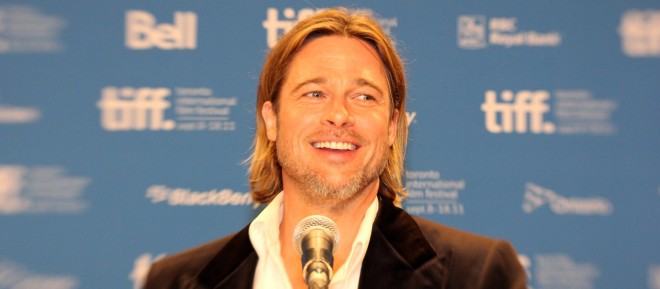Flashback to TIFF2011: Buttonholing Brad Pitt 2.0
We lob that same softball question at Moneyball’s big-money player; Jonah Hill talks about his underdog status, and Philip Seymour Hoffman reminds us that no actor getting work in Hollywood is an “underdog”
Share

A few hours before my colleague, Jessica Allen threw that question to Brad Pitt on front lines of the red carpet—”What’s you’re favorite sports movie”—I asked the same damn question in TIFF’s Moneyball press conference yesterday. I was the first to get a word with Mr. Pitt, and, of course, like a polite Canadian, I didn’t ask about Angelina or the kids or those recent tabloid headlines about her being pissed that he’s allegedly smoking reefer—reefer!— in some obscure “drug den” on their estate. No, like Jessica, I lobbed him a softball query about his favorite sports movie. As on the red carpet, he mentioned his childhood affection for Bad News Bears. Then he talked about how North Dallas Forty, starring Nick Nolte, has a special place in his heart because he snuck into it. But I also asked Brad if the Moneyball strategy—trying to score hits with the right combo of utility players rather than high-priced stars—should be tried, or has been tried by Hollywood.”Well, not if they hired me,” he quipped. He went on to says that, “with digital video on the rise, we’re going to see more of this talent that wouldn’t have had a shot before.” (I can only think that he’s referring, with uncanny prescience, to our rising red carpet star, Jessica Allen).
As the press conference wore on, the issue of disparity between marquee players and hired hands in Hollywood became the prevailing theme. On a podium that included Pitt, Jonah Hill and Philip Seymour Hoffman, the least known actor was Chris Pratt, who plays Scott Hatteberg, the struggling first baseman in Moneyball. And as soon as he opened his mouth, this rather dull affair known as “the Brad Pitt press conference” suddenly perked up. When fielding a group question about what inspired the actors, he compared himself to his character and gushed with genuine passion, “I’ve never done anything like this before. I’m inspired right now! I don’t get paid a shitload of money. You guys got me for really cheap. I’m kinda like Scott Hatteberg.” He went on to rave about the baseball skills of the cast. “Every bit of baseball you see is real. I would put this team against any baseball team in any movie.”
Jonah Hill also weighed in with his underdog credentials. With Superbad, the film that launched his career, he said “I was a very unlikely person to be the star of a big motion picture. And I continually get that underdog opportunity.” In fact, the novelty of his nerdy character in Moneyball is the secret to the movie’s odd couple chemistry. You wonder: what is this guy doing sharing power in the clubhouse with Brad Pitt? Later, when director Bennett Miller launched into a long and lofty dissertation about the beauty of baseball—talking about its “bicameral existence” as romance and science, its attachment to superstition, its timeless, clockless nature, its “long periods of boredom and monotony punctuated by moments of excitement and extreme terror. . . “—Jonah Hill cut him off with a verbal line drive: “He’s trying to say that it looks really cool.”
On the underdog issue, meanwhile, Philip Seymour Hoffman finally put the all this celebrity relativism in perspective by pointing out that no one on the podium was really an underdog actor. “Most actors don’t work,” he reminded us. “Everyone at this table is in the top five per cent.”